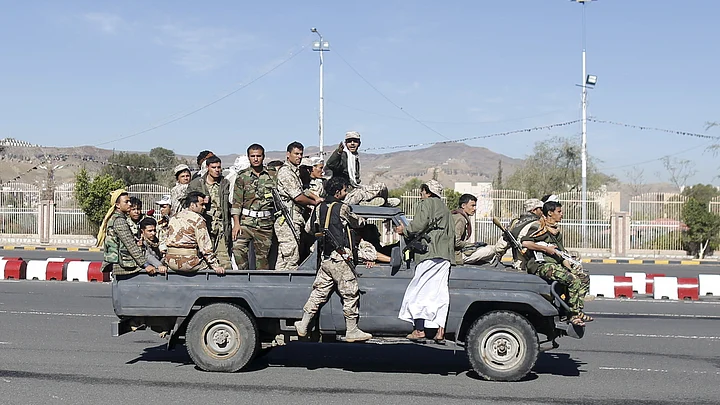President Abed Rabbo Mansour Hadi fled Yemen by sea on Wednesday as Shiite rebels and their allies moved to his refuge in the south, captured its airport and put a bounty on his head, officials said. Hours later, Saudi Arabia announced it had begun airstrikes against the Houthi rebels.
The departure of close US ally and the imminent fall of the southern port of Aden pushed Yemen further toward a violent collapse. It also threatened to turn the impoverished but strategic country into another proxy battle between the Middle East’s Sunni powers and Shiite-led Iran.
The Saudi ambassador to the United States Adel al-Jubeir said his country had begun airstrikes against the rebels. He said his government had consulted closely with the US and other allies but that the US military was not involved in the operations.
The White House said in a statement late Wednesday that the US was coordinating military and intelligence support with the Saudis but not taking part directly in the strikes.
There were indications that others in the region would follow suit: The United Arab Emirates, Kuwait, Qatar and Bahrain joined Saudi Arabia in a statement published by the Saudi Press Agency, saying they would answer a request from Hadi “to protect Yemen and his dear people from the aggression of the Houthi militias which were and are still a tool in the hands of foreign powers that don’t stop meddling with the security and stability of brotherly Yemen.”
Arab leaders are expected to meet in Egypt’s Red Sea resort of Sharm el-Sheik this weekend for a pre-planned summit, which is now expected to be dominated by the developments in Yemen. It is not clear if Hadi will be able to attend the summit.
Saudi Arabia and its Gulf allies believe the Shiite rebels, known as Houthis, are tools for Iran to seize control of Yemen and say they intend to stop the takeover. The Houthis deny they are backed by Iran.
The crumbling of Hadi’s government is a blow to Washington’s counterterrorism strategy against al-Qaida’s branch in Yemen, considered to be the most powerful in the terrorist network. Over the weekend, about 100 US military advisers withdrew from the al-Annad air base where they had been leading a drone campaign against al-Qaida in the Arabian Peninsula, or AQAP.
Yemen now faces fragmentation, with Houthis controlling much of the north, including the capital of Sanaa, and several southern provinces. In recent days, they took the third-largest city, Taiz, as well as much of the province of Lahj, both just to the north of Aden.
The Houthis are backed by former President Ali Abdullah Saleh, the autocrat who ruled Yemen for three decades until he was removed amid a 2011 Arab Spring uprising. Some of the best-equipped and trained military and security units remained loyal to Saleh and they have helped the Houthis in their rapid advance.
Hadi left Sanaa for Aden earlier this month after escaping house arrest under the Houthis, who overran the capital six months ago. In Aden, he had sought to make a last stand, claiming it as the temporary seat of what remained of his government, backed by allied militias and loyal army units.
Security officials in Yemen said the Saudi airstrikes targeted a camp for US-trained special forces, which is controlled by generals loyal to Saleh. The officials said the targets included the missile base in Sanaa that was controlled by the Houthis earlier this year. One of the Yemeni security officials said the strikes also targeted the fuel depot at the base.
The Houthis said in a statement to reporters that Saudi jets hit the military base, known as al-Duleimi, and that they responded with anti-aircraft missiles.
Saudi-owned Al-Hadath TV aired pictures of the operation. The dark screen flashed with glaring lights and there was what sounded like machine guns or possibly anti-aircraft missiles.
Shortly after Hadi fled his palace in Aden, warplanes targeted presidential forces guarding it. No casualties were reported. By midday, Aden’s airport fell into hands of forces loyal to Saleh based in the city after intense clashes with pro-Hadi militias.
Yemen’s state TV, now controlled by the Houthis, announced a bounty of nearly $100,000 for Hadi’s capture.
(The story has been edited for length.)
(At The Quint, we question everything. Play an active role in shaping our journalism by becoming a member today.)
